Energy and Climate Change
Energy and Climate Change (EC)
Energy efficient appliances
Most DEU buildings are designed to take full advantage of natural daylight. They include wide glass facades that allow sunlight to fill the interior spaces throughout the day. This design not only creates a bright and pleasant atmosphere but also reduces the need for artificial lighting, helping the university save a significant amount of energy.
In order to enhance energy efficiency across DEU buildings, continuous upgrades are carried out on heating and cooling systems. The pumps operating within these systems are being replaced with IE3-class automatic variable-speed pumps. These pumps, classified as high-efficiency according to international energy performance standards, significantly reduce energy consumption by adjusting their operating speed based on real-time system demand. Through these upgrades, DEU ensures more sustainable and efficient energy management throughout its campus facilities.
Without requiring structural modifications, DEU continuously updates its interior equipment to enhance energy efficiency. Classrooms, common areas, and staff offices are generally outfitted with LED lighting, while older fluorescent lighting systems are systematically replaced to ensure optimal energy use. In the previous year 900 more LED lamps were replaced with the fluorescent lamps.
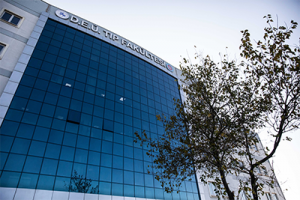
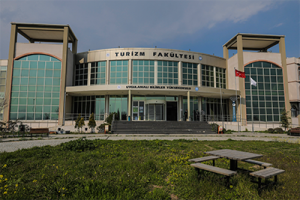
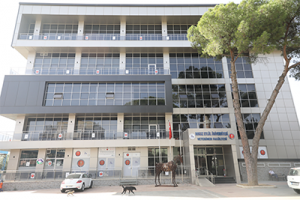
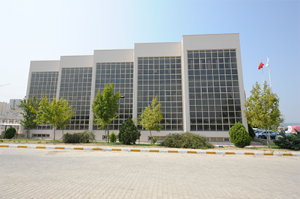
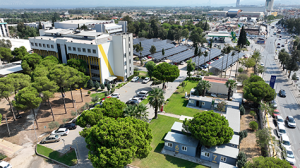
Total campus smart building area (m2)
The total area (including ground floors and other floors) of Dokuz Eylul University smart buildings is reported as 231.867 m2.
| UNIT | Quantity | Area (m2) |
| Intensive Care Unit | 8 | 7.051 |
| Operation Room | 25 | 7.975 |
| Laboratory | 17 | 4.994 |
| Pharmacy | 1 | 1.137 |
| Radiology Area | 2 | 2.819 |
| Nuclear Medicine Area | 1 | 1.319 |
| Sterilization Area | 1 | 1.120 |
| Blood Bank | 1 | 810 |
| Dialysis Center | 1 | 857 |
| Radiation Oncology | 1 | 1.858 |
| Angiography | 3 | 448 |
| Total Indoor Area | 60 | 30.388 |
| No. | Name
|
Place
|
automation | safety | energy | water | Indoor environment | lighting | Building Area (m²)
|
||||||||||||
| B1 | B2 | S1 | S2 | S3 | S4 | E1 | E2 | A1 | A2 | I1 | I2 | I3 | I4 | L1 | L2 | L3 | L4 | ||||
| 1 | Dokuz Eylul University; DEPARK Technology Development Zone in Tınaztepe Campus (TGB-1) | Izmir, Turkey | x | x | x | x | x | x | x | x | x | x | 17413 | ||||||||
| 2 | Dokuz Eylul Univeristy; DEPARK Technology Development Zone in 15 Temmuz Campus (TGB-2) | Izmir, Turkey | x | x | x | x | x | x | x | x | x | x | 10487 | ||||||||
| 3 | Dokuz Eylul Univeristy; New Hospital Management Building | Izmir, Turkey | x | x | x | x | x | x | x | x | x | x | 23335 | ||||||||
| 4 | Dokuz Eylul Univeristy; İzmir Bio Genom Institute (İBG) | Izmir, Turkey | x | x | x | x | x | x | x | x | x | x | 22250 | ||||||||
| 5 | Dokuz Eylul Univeristy; Faculty of Law | Izmir, Turkey | x | x | x | x | x | x | x | x | x | x | 26000 | ||||||||
| 6 | Dokuz Eylul Univeristy; Central Laboratory Building | Izmir, Turkey | x | x | x | x | x | x | x | x | x | x | 4270 | ||||||||
| 7 | 15 Temmuz Health and Art Campus Common Classrooms Building | Izmir, Turkey | X | X | X | X | X | X | X | X | X | X | 5742 | ||||||||
| 8 | Foreign Languages Vocational School Buıildings | Izmir, Turkey | X | X | X | X | X | X | X | X | X | X | 19430 | ||||||||
| 9 | Faculty of Medicine, Basic Sciences and Dean’s Building | Izmir, Turkey | X | X | X | X | X | X | X | X | X | X | 21815 | ||||||||
| 10 | Faculty of Fine Arts and State Conservatory Building | Izmir, Turkey | X | X | X | X | X | X | X | X | X | X | 22900 | ||||||||
──────── Please compile one row for each building (or homogeneous part of it) by ticking with a “X” for each requirement ────────
| No. | Name
|
Place
|
automation | safety | energy | water | Indoor environment | lighting | Building Area (m²)
|
||||||||||||
| B1 | B2 | S1 | S2 | S3 | S4 | E1 | E2 | A1 | A2 | I1 | I2 | I3 | I4 | L1 | L2 | L3 | L4 | ||||
| 11 | Dokuz Eylul University; Renovated Units within the Application Hospital | Izmir, Turkey | x | x | x | x | x | x | x | x | x | x | 30388 | ||||||||
| 12 | Dokuz Eylul Univeristy; Fuat Sezgin Central Library | Izmir, Turkey | x | x | x | x | x | x | x | x | x | x | 13000 | ||||||||
| 13 | Dokuz Eylul Univeristy; Sabancı Culture Palace | Izmir, Turkey | x | x | x | x | x | x | x | x | x | x | 5758 | ||||||||
| 14 | Dokuz Eylul Univeristy; Tınaztepe Swimming Pool | Izmir, Turkey | x | x | x | x | x | x | x | x | x | x | 4014 | ||||||||
| 15 | Dokuz Eylul Univeristy; İnciraltı Swimming Pool | Izmir, Turkey | x | x | x | x | x | x | x | x | x | x | 3752 | ||||||||
| 16 | Dokuz Eylul Univeristy; Seferihisar Swimming Pool | Izmir, Turkey | x | x | x | x | x | x | x | x | x | x | 2993 | ||||||||
| Total | 233547 | ||||||||||||||||||||
Renewable energy sources and their capacity (in kilowatt-hour)
The Solar Energy Project at Dokuz Eylul University was launched in March 2022 with the beginning of system installations. Within the scope of the project, solar power systems with a total installed capacity of 15,205 kWe were completed across several campuses, including the 15 July Health and Art (İnciraltı) Campus, the Institute of Marine Sciences and Technology Campus, the Dokuzçeşmeler (Faculty of Economics and Administrative Sciences) Campus, the Faculty of Education Campus, the Tınaztepe Campus, and the Torbalı Campus. The project was successfully completed to help meet the university’s energy needs through renewable sources. The energy produced by the Solar Energy Pannels between September 2024-August 2025 equals to 24.658.977,88 kWh.
The University utilized 1.907.000 kWh of geothermal energy at the 15 July Health and Arts Campus.
Dokuz Eylul University kitchens collect waste vegetable oils separately and store them safely in designated areas. These oils are then sent to a licensed recycling company, where they are processed into biodiesel. During the reporting period, the university delivered a total of 4.140 kg of waste vegetable oil to the contracted company. This effort supports sustainable waste management and renewable energy production, helping to generate approximately 43.720 kWh energy from recycled oil.
A small wind turbine installed on the roof of the Science and Technology Research and Application Building provides lighting at night. The energy produced by the turbine powers the lamps after sunset, ensuring constant and sustainable illumination while supporting the use of renewable energy. It produces 913 kWh energy per year.

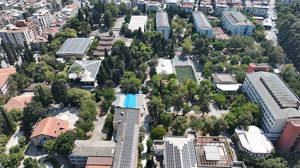
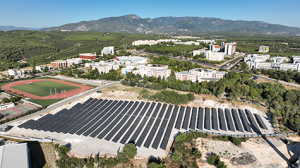
Electricity usage per year (in kilowatt hour)
During the 2024–2025 period, total electricity consumption across Dokuz Eylul University campuses reached 24.089.827 kWh. This amount covers the combined energy use of both administrative and academic units, along with the Health, Culture and Sports (SKS) Department. The SKS Department manages various facilities and activities, including canteens, cafeterias, student dormitories, cultural events, and part-time student employment programs. Electricity in these areas is primarily used for lighting, heating, cooling, and laboratory operations.
The total electricity usage divided by total campus’ population is calculated as 334,6 kWh / person
During the subsequent period, from September 2024 to August 2025, the photovoltaic systems of solar energy generated 24.658.977 kWh of electricity, excluding the production data of the Application and Research Hospital. In parallel, the geothermal energy systems produced 1.907.000 kWh of energy, as calculated from monthly generation values for the same period, likewise excluding the hospital. Overall, the university’s total energy consumption during the reporting year amounted to 47.261.987 kWh, while 26.610.610 kWh originated from renewable sources, solar and geothermal energy. This corresponds to approximately 56,3 % of the total energy demand.
Energy use in DEU Campuses
| (m3) | kWh | |
| Natural Gas Use | 2.015.655 | 21.265.160 |
| Electricity Use in DEU Units | 24.089.827 | |
| Geothermal Energy –Renewable Energy | 117.642 | 1.907.000 |
| TOTAL | 47.261.987 |
Renewable energy use in DEU Campuses
| Energy type | kWh |
| Solar energy | 24.658.977 |
| Geothermal energy | 1.907.000 |
| Supporting biodiesel production | 43.720 |
| Wind turbine | 913 |
| TOTAL | 26.610.610 |
[2.9] Elements of green building implementation as reflected in all construction and renovation policies (EC.6)
All buildings across Dokuz Eylul University campuses have been designed and constructed with architectural layouts and façade systems that maximize the utilization of natural daylight. The use of glass-intensive facades and wide window profiles enables interior spaces to receive abundant sunlight throughout the day, thereby significantly reducing the need for artificial lighting. This design approach not only enhances visual comfort and indoor environmental quality, but also contributes to energy conservation by lowering overall electricity consumption associated with lighting and temperature regulation. As a result, the buildings are characterized as environmentally friendly and energy-efficient, reflecting the university’s commitment to sustainable architectural practices and climate-responsive design principles.
Solar panels installed on the rooftops of Dokuz Eylul University buildings are an important part of the university’s green building approach. These panels produce clean electricity from sunlight, which helps reduce the use of fossil fuels and lowers carbon emissions. Using renewable energy on building roofs also supports energy efficiency and sustainability goals. This practice shows the university’s effort to create environmentally friendly and energy-efficient campuses.
Newly constructed DEU buildings incorporate central heating and cooling systems designed for high energy efficiency, reducing individual unit energy losses. In existing buildings, older air conditioners have been replaced with high-efficiency inverter systems (e.g., 164 high-efficiency units replaced 241 older models in 2024). LED lighting systems have progressively replaced traditional lighting across campuses to lower electricity demand.IN the previous year, 900 replacements were done for this progress.
Many DEU buildings integrate dual-flush sanitary systems and aerator-equipped faucets to reduce water consumption. Rainwater harvesting and greywater reuse systems are under consideration or partially implemented in new facilities.
As part of the Energy Survey Report, prepared in accordance with the Energy Efficiency Law No. 5627 and related regulations, a contracted company examined the building automation systems on eight Dokuz Eylul University campuses. All buildings have valid Energy Performance Certificates, showing that they meet national energy efficiency standards.
The energy managers at DEU continue to monitor electricity, natural gas, and water use in these buildings. They work to reduce energy consumption, improve heating and lighting systems, and promote the use of solar and geothermal energy. Therefore, DEU buildings are operated more efficiently and support the goals of green building and sustainable campus development. In this way, the university’s approach to green building implementation covers more than 3 elements.
Total carbon footprint (CO2 emission in the last 12 months, in metric tons)
(According to Greenmetrics Standards)
There are 9 shuttles operating on the campuses, each shuttle carries an average of 55 passengers, and each shuttle makes an average of 11 trips. During each trip, the shuttles travel approximately 4 kilometers within the campus. Furthermore, there is an average of 1375 cars and 650 motorcycles on the campus, with both cars and motorcycles covering an approximate travel distance of 2 kilometers.
Using this data, the total annual CO2 emissions have been computed as 20.637 metric tons, as determined by the calculation formula outlined in Appendix 3.
Total carbon footprint divided by the total campus population is 0.286 metric tones.
Impactful university program(s) on climate change (EC.10)
At Dokuz Eylül University, many undergraduate and graduate courses related to clean energy and climate change are offered within the Institutes and the Departments of the Faculty of Engineering. In addition, there are graduate thesis studies directly related to this subject. Within the Institute of Natural and Applied Sciences, which is an important component of DEU’s graduate education programs, there are also graduate courses covering climate change, carbon footprint, energy efficiency, renewable energy systems, and sustainable development. These courses are attended by both domestic and international students, reflecting the university’s commitment to providing education at an international level.
In the field of social sciences, elective courses and research projects are conducted addressing the economic, social, and political impacts of climate change.
At Dokuz Eylül University, the Energy Application and Research Center (EUAM) was established in 2015 and carries out research, development, and applied studies in the field of energy technologies and sustainable energy systems. The center’s activities cover renewable energy sources (solar, wind, geothermal, biomass, hydrogen), nuclear energy, fossil fuels, and energy efficiency. The center examines energy production, storage, transmission, and consumption processes in terms of environmental impact, and conducts technical studies on energy conversion technologies, carbon emission reduction, and the implementation of smart energy systems.
In addition to research and applied activities, EUAM plays an active role in scientific events and awareness programs. In 2024, it contributed to the 3rd International Graduate Research Symposium, organized in collaboration with the Institute of Science at Dokuz Eylül University, and held various panels and workshops on energy efficiency, hydrogen technologies, and sustainable energy. The center is also one of the main stakeholders of the 9th International Hydrogen Technologies Congress (IHTEC-2025) held in 2025. Furthermore, as part of Energy Efficiency Week, EUAM organizes student workshops, technical seminars, and campus-wide solar energy implementation projects and energy audits, aiming to strengthen research infrastructure and raise awareness of sustainable energy in society.
Dokuz Eylül University has initiated the establishment of the Energy Management Unit to regulate energy management practices and ensure the efficient use of energy. The main objectives include preventing energy waste, reducing the impact of energy costs on the university budget, lowering carbon emissions, and protecting the environment in the fight against climate change. The university is committed to supporting the energy management policy by raising staff awareness, ensuring the participation of all stakeholders in the system, and creating a working environment based on energy efficiency consciousness. Additionally, promoting the use of renewable energy sources, evaluating the impact of operational decisions on energy management, controlling process risks and critical energy consumption areas, and supporting designs and products that improve energy performance are central implementation goals of the unit.
Within this scope, in line with sustainability goals, the university organized the “Energy Efficiency Awareness Seminar” with the participation of all faculty administrators, aiming to increase energy awareness and knowledge across the entire campus.
Therefore, DEU provides trainings, educational materials, and seminars/conferences which are implemented by communities at both national and international levels.

